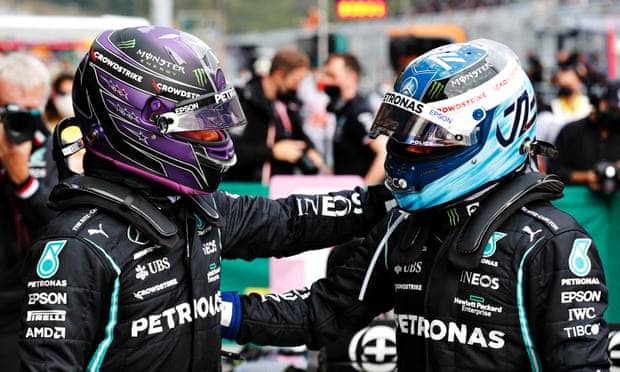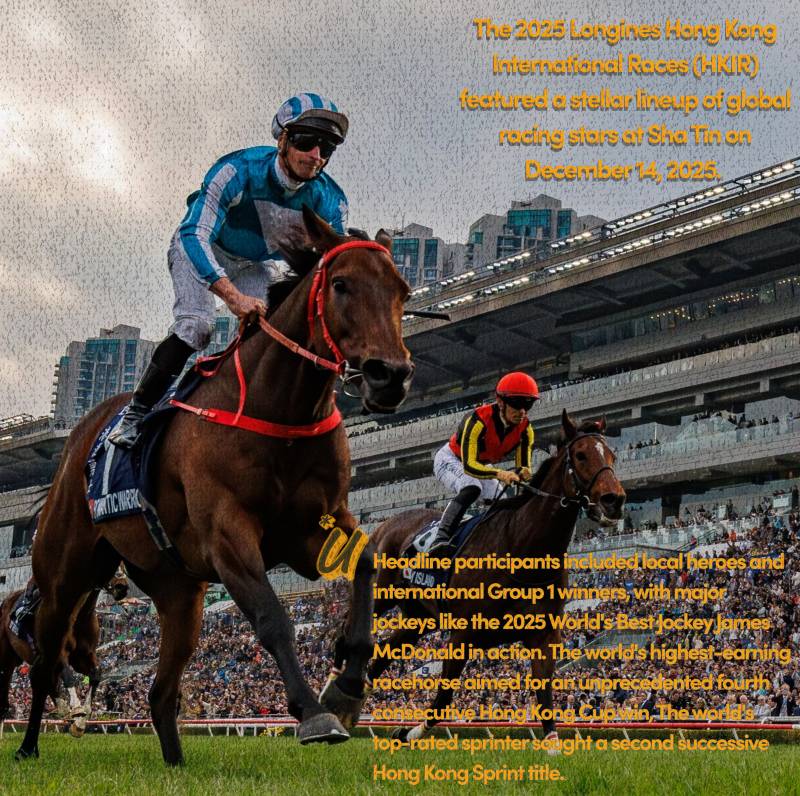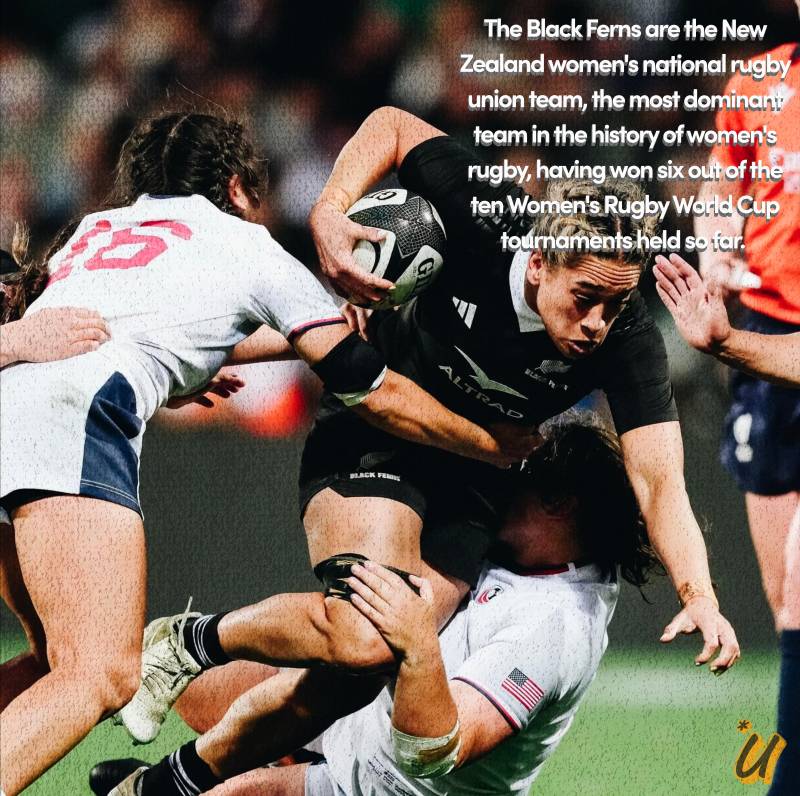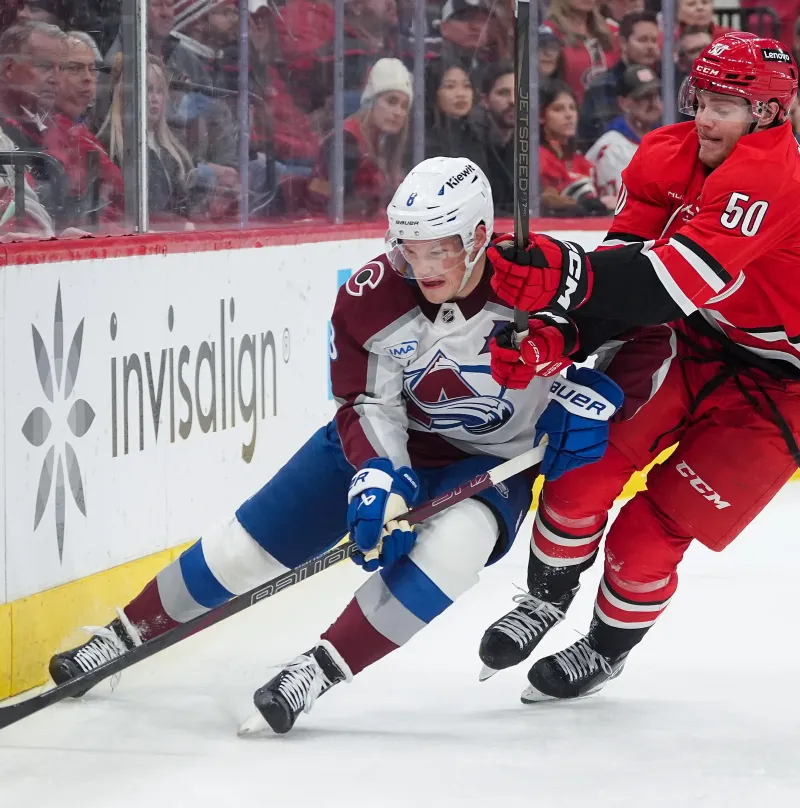Lewis Hamilton was unquestionably the fastest man on track in qualifying for the Turkish Grand Prix but his commanding performance will not be recognised by the history books as pole position – a facet of Formula One’s regulations that, it seems, does not sit well with its leading drivers.
Hamilton’s 10-place grid penalty for taking a new engine means he will start from 11th, while his Mercedes teammate, Valtteri Bottas, inherits pole from second place, with Hamilton’s title rival, Max Verstappen, in practice completing the front row for Red Bull from third place.
Daniel Ricciardo the star in the Netflix-isation of sport
Kieran Pender
Read more
Hamilton has a record 101 poles already under his belt and clocking up numbers clearly does not keep the world champion awake at night. Of greatest import is that he did what he had to do in his attempt to come back from his grid penalty. He said he wanted to ensure he started as high up the field as possible and duly delivered with a lap that was the class of the field and a track record. But not pole number 102.
All three drivers agreed that F1 should address the clear incongruity that, when penalties are applied, the sport does not honour the quickest driver as having taken pole.
“That was my best pole ever,” Hamilton joked when reminded that it would not count as such in the record books. “I got pole, I don’t think the penalty should affect that necessarily.” Bottas agreed. “Lewis had the fastest single lap,” he said. “He was technically on pole but afterwards he gets dropped and I don’t think it’s really fair.” Verstappen also believed that F1 should consider its regulations. “The guy who does the fastest lap should deserve pole position,” he said.
It remains moot for now and Hamilton’s focus is on bigger things. The real business remains for Sunday. He must come through the field to minimise the potential points loss to Verstappen, whom he leads by only two points in the championship.
Bottas’s role for Hamilton and Mercedes, a team that has dropped him for next season, is simple: keep Verstappen behind him. Hamilton faces an altogether trickier prospect. Starting in the midfield he must be aggressive but cannot afford any damage. The seven-times champion certainly has the pace and the form: he has been quickest all weekend and has made his mark distinctively twice before at Istanbul Park.
Lewis Hamilton takes the trophy for finishing fastest in qualifying but will not be on pole position
Lewis Hamilton takes the trophy for finishing fastest in qualifying but will not be on pole position. Photograph: Ümit Bektaş/Reuters
In 2006 in GP2 he came back from a spin that dropped him to 19th place to claim second. Last year he recovered from sixth to win in a masterclass that sealed his seventh title. He noted that his approach on Sunday would be “balanced” in managing aggression and care.
“It’s not going to be easy to fight my way through but where there is a will there’s a way,” he said. “But getting past people will not be easy.” Just how well he manages could be of huge importance in a title fight where there is nothing to choose between the two protagonists. However, with Red Bull unable to match the Mercedes for pace here, Hamilton can hope at least to catch Verstappen.
In qualifying he definitively proved he has the tools to do so. On a cold but drying track after a wet morning in Istanbul, Bottas set the early pace on his first hot lap in Q3. Last season the newly resurfaced track was severely lacking in grip. This year it was greatly improved after ageing and being water blasted, but with the surface still damp it remained testing. Bottas was particularly strong through the first and third sectors and laid down a marker with a time of 1min 23.071sec, two-hundredths up on Hamilton.
On their second runs the pressure ramped up with the sun shining and conditions the best they had been all day. Hamilton went out early with the track to himself and immediately flew. He was quickest in all three sectors and set a time of 1:22.868.
He had provisional pole but cruised for a lap before making a second run on the same tyres. It was not needed as no one could match that first time, when he had it hooked up to perfection. Bottas was a tenth back with Verstappen three-tenths down. Hamilton had dominated – now he has it all to do again on Sunday.
The Mercedes team principal, Toto Wolff, said he had faith in Hamilton’s ability to fight from the back. “Lewis can only try and do his best, and I wouldn’t want any other driver in the car when it is about overtaking and going through the field,” he said.
Ferrari’s Charles Leclerc was in fourth with AlphaTauri’s Pierre Gasly in fifth.
Fernando Alonso was in sixth for Alpine, with Red Bull’s Sergio Pérez in seventh and Lando Norris eighth for McLaren. Lance Stroll was in ninth for Aston Martin and Yuki Tsunoda was in 10th for AlphaTauri.
Carlos Sainz was in 15th for Ferrari but the team did not run him competitively in Q2 as he will start from the back of the grid after taking a full new power unit. Mick Schumacher put in a superb performance to make it to Q2 and finished in 14th for Haas. Sebastian Vettel was in 11th for Aston Martin, Esteban Ocon 12th for Alpine and George Russell in 13th for Williams.
Daniel Ricciardo was a disappointing 15th for McLaren. Nicholas Latifi was 17th for Williams. Antonio Giovinazzi and Kimi Räikkönen were in 18th and 19th for Alfa Romeo, with Nikita Mazepin in 20th for Haas.
… as you're joining us from Singapore, we have a small favour to ask. Tens of millions have placed their trust in the Guardian’s high-impact journalism since we started publishing 200 years ago, turning to us in moments of crisis, uncertainty, solidarity and hope. More than 1.5 million readers, from 180 countries, have recently taken the step to support us financially – keeping us open to all, and fiercely independent.
With no shareholders or billionaire owner, we can set our own agenda and provide trustworthy journalism that’s free from commercial and political influence, offering a counterweight to the spread of misinformation. When it’s never mattered more, we can investigate and challenge without fear or favour.
Unlike many others, Guardian journalism is available for everyone to read, regardless of what they can afford to pay. We do this because we believe in information equality. Greater numbers of people can keep track of global events, understand their impact on people and communities, and become inspired to take meaningful action.
We aim to offer readers a comprehensive, international perspective on critical events shaping our world – from the Black Lives Matter movement, to the new American administration, Brexit, and the world's slow emergence from a global pandemic. We are committed to upholding our reputation for urgent, powerful reporting on the climate emergency, and made the decision to reject advertising from fossil fuel companies, divest from the oil and gas industries, and set a course to achieve net zero emissions by 2030.
If there were ever a time to join us, it is now. Every contribution, however big or small, powers our journalism and sustains our future. Support the Guardian from as little as $1 – it only takes a minute. If you can, please consider supporting us with a regular amount each month. Thank you.
SOURCE : TheGuardian




